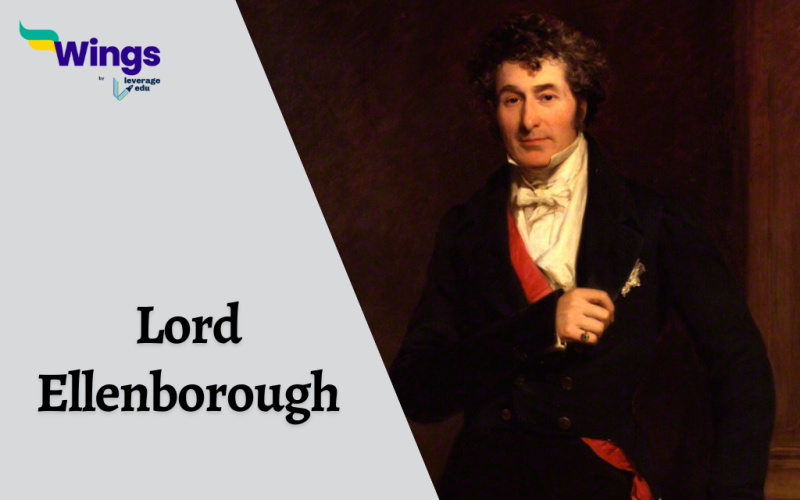Lord Ellenborough also known as Edward Law was the Governor General of India from 1842 to 1844. He took his seat in the parliament in the House of Commons in 1813 and the House of Lords as a baron after his father’s death. The lord was also the president of the Board of Control for India from 1828-1830 and then again in 1834-1841, before becoming the Governor General of India. In this blog, we will delve into the role of Lord Ellenborough in India and know about the events that took place during his tenure.
Table of Contents
What was the Role of Lord Ellenborough in India?
Lord Ellenborough was sent to India with the motive to restore peace in Asia. As soon as he took his leadership role in India, he annexed Sindh and destroyed Kabul. Some of the significant events that took place during his tenure are –
- Annexation of Sindh
One of Lord Ellenborough’s most notable actions during his tenure was the annexation of Sindh which was a region located in present-day Pakistan. This move was a significant strategically important move, as it aimed to secure British interests in the region and prevent any potential threats from emerging.
- He recognized the rising power of the Sikh Empire in Punjab and sought to establish a buffer zone by acquiring Sindh.
- It was formally annexed by the British East India Company on February 17, 1843.
- The conquest of Sindh involved a military campaign led by Sir Charles Napier, with the support of Governor-General Lord Ellenborough.
- Two battles, the Battle of Miani and the Battle of Dobo were fought between 3000 British army and 12,000 Baluchis.
- The campaign resulted in the defeat of the Talpur Mirs and the establishment of British rule in Sindh.
By annexing Sindh, the British effectively gained control over the Indus River which was a vital waterway for trade and transportation in the region. This move further solidified the British control over the Indian Subcontinent which reinforced their dominance in the region.
- War with Gwalior
In addition to his political initiatives, Lord Ellenborough left a lasting military legacy through his involvement in the war with Gwalior. This conflict arose due to the instability in the Gwalior state that posed a threat to British interests.
- The Battle of Maharajpur took place on December 29, 1843, which was a crucial engagement in the war with Gwalior.
- The British forces which was led by Sir Hugh Gough emerged victorious and defeated the Maratha Confederacy’s army
- The victory paved the way for the imposition of terms and conditions favourable to the British Treaty of Gwalior.
The victory showcased Lord Ellenborough’s strategic acumen and his ability to effectively mobilize resources in times of conflict. The war with Gwalior marked a significant step towards consolidating British control and furthering their imperial ambitions.
Also Read – Treaty of Versailles: A Prelude to WW2 | World History Notes
Legacy of Lord Ellenborough
Lord Ellenborough’s contribution to India extends beyond the annexation of Sindh and the war with Gwalior. He implemented several administrative reforms and policies that aimed to promote British interests and strengthen British control over India. Some
- Construction of Railways: Lord Ellenborough envisioned the importance of railways and initiated the construction of the Great Indian Peninsula Railway, a groundbreaking development in India’s transportation infrastructure.
- Educational Reforms: Recognizing the need for education, he implemented policies to promote Western-style education in India and laid the foundation for future educational reforms.
- Financial Reform: He introduced the reforms to streamline India’s financial administration including the establishment of uniform currency and the reorganization of the Indian fiscal system.
- Societal Reform- Lord Ellenborough was the first Governor General to abolish slavery and passed an act named the Indian Slavery Act of 1843, to ban slavery.
Also Read – What is the Difference Between Governor-General and Viceroy?
Lord Ellenborough made a significant mark and is remembered for his involvement in the annexation of Sindh. Later, in the year 1858, he was forcefully asked to retire for intentionally publishing a private letter of criticism of the actions of Lord Charles Canning’s settlement in the War of 1857.
Relevant Blogs
| Lord Cornwallis | Lord Curzon |
| Lord Lansdowne | Lord Dalhousie |
| Lord Auckland | Lord Amherst |
| Lord Macaulay | Lord Lytton |
| Lord Minto I | Lord William Bentinck |
| Lord Charles Metcalfe | Lord Irwin |
FAQs
In 1843, during the tenure of Lord Ellenborough as the Governor-General of India, Charles Napier led a military campaign that resulted in the annexation of Sindh. The military forces under Napier’s command emerged victorious in the battles of Miani and Dobo.
In 1833, the Charter Act was passed to abolish slavery throughout the British Indian empire. Ten years later, in 1843, the Indian slavery act was enacted, making slavery illegal throughout India. Lord Ellenborough was the Governor-general at that time.
The Indian Slavery Act of 1843, also known as Act V of 1843, was a law passed during British India’s East India Company rule. The act prohibited many economic transactions that were associated with slavery.
We hope you liked the blog. If you want to read more articles like this you can visit our general knowledge page on Indian History!
 One app for all your study abroad needs
One app for all your study abroad needs













